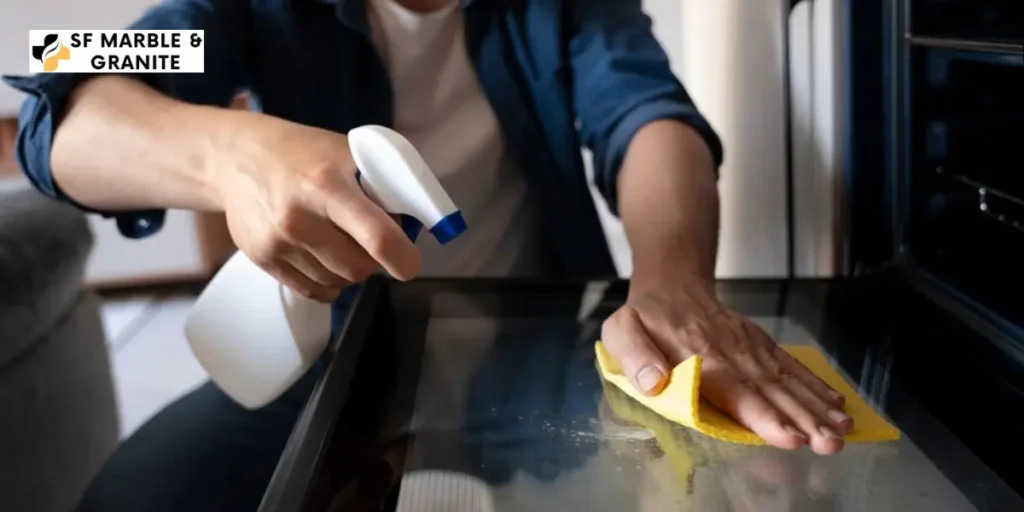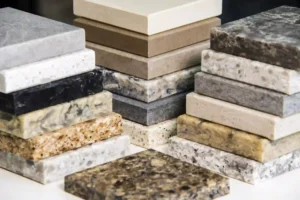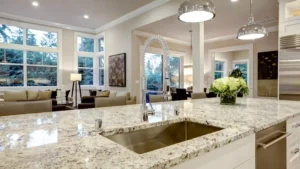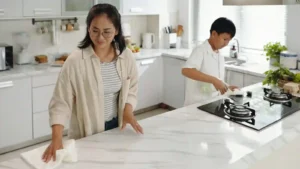Granite countertops are a beautiful and durable addition to any kitchen or bathroom, but they do require proper care to maintain their natural elegance. Knowing how to clean granite countertops properly can help keep them looking pristine for years. In this article, we’ll guide you on the best ways to clean granite, how to handle tough stains, and how to prevent damage from daily use.
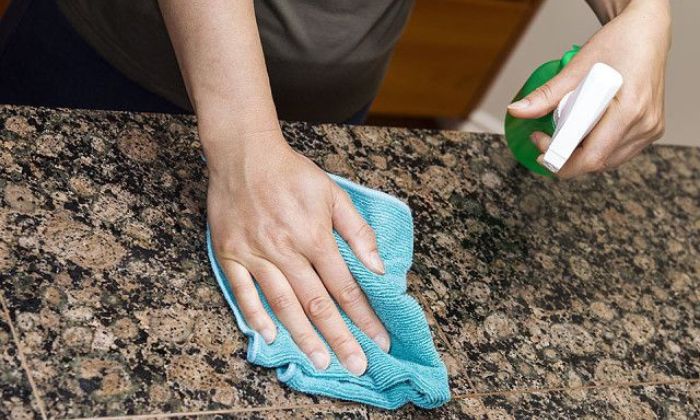
Table of Contents
ToggleWhat You’ll Need
Before diving into the cleaning process, it’s essential to gather the right tools and materials. Having everything you need on hand will make the job easier and ensure you don’t accidentally damage the surface.
Equipment/Tools:
- Soft microfiber cloths or sponges
- Dish soap or a gentle pH-balanced cleaner
- Spray bottle
- A soft brush (optional for tough spots)
- Clean towels for drying
Materials:
- Warm water
- Isopropyl alcohol (for disinfecting)
- Granite-safe sealant
- Stain removers (depending on the type of stain)
Best Way to Clean Granite Countertops
Cleaning granite countertops doesn’t have to be difficult, but using the right methods and products is crucial to preserving their beauty. Below are some essential tips to follow to ensure your countertops remain spotless and undamaged.
1. Sealant
Granite is naturally porous, which means it can absorb liquids and oils. To prevent staining and damage, it’s important to apply a granite sealant regularly. This creates a protective barrier that makes cleaning granite countertops easier and helps prevent stains from penetrating the surface. Apply sealant once a year or as recommended by the manufacturer to keep your countertops protected.
2. Heat Protection
While granite is heat resistant, it’s always a good idea to use trivets or hot pads when placing hot pots or pans on the surface. Extreme temperature changes can weaken the sealant, leading to damage over time. Prevent heat damage by using heat-resistant mats or trivets.
3. Avoid Sharp Objects
Granite is durable, but using sharp objects directly on its surface can cause scratches and dull the finish. Always use a cutting board or a mat to protect your countertops from knife marks. This simple practice will preserve the shine and integrity of your granite.
4. Regular Dusting
Dust and debris can build up on granite countertops, leaving them looking dull. Regularly dust your countertops with a soft cloth to remove particles that can scratch the surface. This step will keep your granite clean and maintain its polished look.
5. Stain Prevention
To prevent stains on granite countertops, be quick to wipe up spills, especially from oils, wine, coffee, and acidic substances like lemon juice. These materials can seep into the stone and cause discoloration if left unattended. Having a proactive approach to cleaning can help you avoid the hassle of dealing with stubborn stains later.
How to Clean Granite Countertops Daily
Cleaning granite countertops daily doesn’t require complex products or methods. It’s all about consistency and using the right cleaner for granite countertops.
1. Gather Your Supplies
Before you start, make sure you have your microfiber cloths, dish soap, and warm water ready. You can also opt for a granite-specific cleaner, but mild dish soap mixed with warm water is a great, budget-friendly option for daily use.
2. Prepare Your Cleaning Solution
Mix a small amount of mild dish soap with warm water in a spray bottle or bowl. Avoid using harsh chemicals, as they can damage the stone’s sealant. For disinfecting, you can add a bit of isopropyl alcohol to the mixture (about 25% alcohol to 75% water) to clean and sanitize your countertops effectively.
3. Wipe Down the Countertops
Spray the cleaning solution onto the granite surface or dip a microfiber cloth into the soapy water. Gently wipe down the countertops in circular motions to lift off dirt and grime. Microfiber is ideal because it’s soft and won’t scratch the surface.
4. Rinse and Dry
After cleaning the surface, it’s essential to rinse off any soap residue. Use a clean damp cloth to wipe the countertops again. Then, dry the surface with a soft towel to prevent water spots. This step is especially important for maintaining a streak-free shine.
5. Address Stains Promptly
If you notice a spill or stain, address it immediately to prevent it from setting in. Clean the area as soon as possible to avoid permanent staining. The quicker you act, the easier it will be to clean granite countertops without leaving marks behind.
How to Clean Granite Countertop Stains
Even with regular care, granite countertops can sometimes develop stains. The key is identifying the type of stain and using the right methods to clean it effectively.
Sticky Stains
Sticky stains, like those from syrup or honey, can be challenging to remove. For these types of stains, apply a bit of dish soap and warm water to the affected area. Use a soft sponge to gently scrub the sticky residue. For tougher sticky stains, you can use a granite cleaner or a mixture of baking soda and water (in a paste form) to break down the sticky substance.
Water Stains
Water stains are common, especially if you leave water on the surface for an extended period. To remove water stains from granite, mix equal parts of baking soda and water to form a paste. Apply the paste to the stain, cover it with plastic wrap, and let it sit for a few hours. Afterward, wipe away the paste and rinse the area with clean water.
Tough Stains
Oil-based stains or those caused by food and beverages like coffee or wine require a different approach. For these, use a cleaner designed specifically for granite countertops. A poultice made from baking soda and water can also work wonders for tough stains. Apply the paste to the stained area and let it sit for several hours before wiping it away.
Tips for Preventing Granite Stains
Preventing stains on granite countertops is essential for keeping your surfaces looking as good as new. Here are some tips for avoiding stains:
- Seal your granite countertops regularly: A high-quality granite sealant creates a protective barrier, making it harder for stains to penetrate the surface.
- Wipe spills immediately: Oils, sauces, and beverages can leave stains if not cleaned promptly. Keep a cloth or paper towel handy to wipe up spills.
- Avoid acidic cleaners: Strong acids, like vinegar, can eat away at the granite and damage the sealant. Stick to pH-balanced cleaners designed for granite.
- Use placemats and coasters: Avoid placing hot items or acidic substances directly on the granite. Use trivets, coasters, and placemats to protect the surface.
How to Make Granite Countertops Last Longer
Granite countertops are designed to last a lifetime, but only if you take proper care of them. Here are a few tips to ensure your granite countertops stand the test of time:
- Apply a protective sealant: Seal your countertops at least once a year to prevent staining and maintain their glossy finish.
- Use heat protection: Although granite is heat-resistant, direct exposure to hot items can weaken the sealant and potentially cause damage. Always use heat resistant mats or trivets.
- Regularly clean and maintain: Cleaning granite countertops regularly and addressing stains promptly will help keep them in top condition.
Why SF Marble & Granite is the Best Choice to Clean Granite Countertops
When it comes to caring for granite countertops, it’s important to rely on experts who understand the nuances of the material. SF Marble & Granite offers professional cleaning, sealing, and restoration services to keep your countertops in pristine condition. With years of experience and a commitment to quality, SF Marble & Granite ensures your countertops are cleaned properly, so you don’t have to worry about damaging your investment.
How to Clean Granite Countertops Before and After Your Next Countertops Installation in Lowell
Keeping your granite looking its very best starts with gentle, regular care: mix a few drops of pH-balanced dish soap with warm water, wipe down your surface using a soft microfiber cloth in circular motions, then rinse and dry immediately to prevent streaks this simple routine not only lifts everyday grime but also protects the sealant that guards against stains and etching.
For tougher spots, make a baking-soda paste (two parts baking soda to one part water), apply it to the stain, cover with plastic wrap for a couple of hours, then gently wipe away always finish with a quick wipe of soapy water, rinse, and a soft towel dry. By following these easy steps both before and after a professional Countertops Installation in Lowell, you’ll preserve your granite’s natural shine and ensure it stays as stunning as the day it was installed.
Conclusion
Learning how to clean granite countertops is essential to preserving their beauty and durability. By following the tips outlined in this guide, such as using the right cleaner for granite countertops, applying sealant, and addressing stains promptly, you can keep your countertops looking brand new for years to come. Regular cleaning and maintenance are key to preventing damage and ensuring the longevity of your granite surfaces. Remember, proper care today will help your countertops last longer, retaining their stunning appeal.
FAQs
How often should I clean my granite countertops?
Wipe down daily with a mild soap solution and a microfiber cloth; deep clean and reseal every 6–12 months.
Can I use vinegar or commercial cleaners on granite?
No, acidic cleaners like vinegar can erode sealants; stick to pH-balanced products made for stone.
What’s the best method to remove oil-based stains?
Create a poultice with baking soda and water, apply, cover, let sit 4–6 hours, then rinse and dry.
When should I reseal my granite?
Test annually by dropping a few drops of water on the surface if it soaks in within 10–15 minutes, it’s time to reseal.
Will hot pans damage granite?
While granite resists heat, always use trivets or hot pads to avoid weakening the sealant over time.

